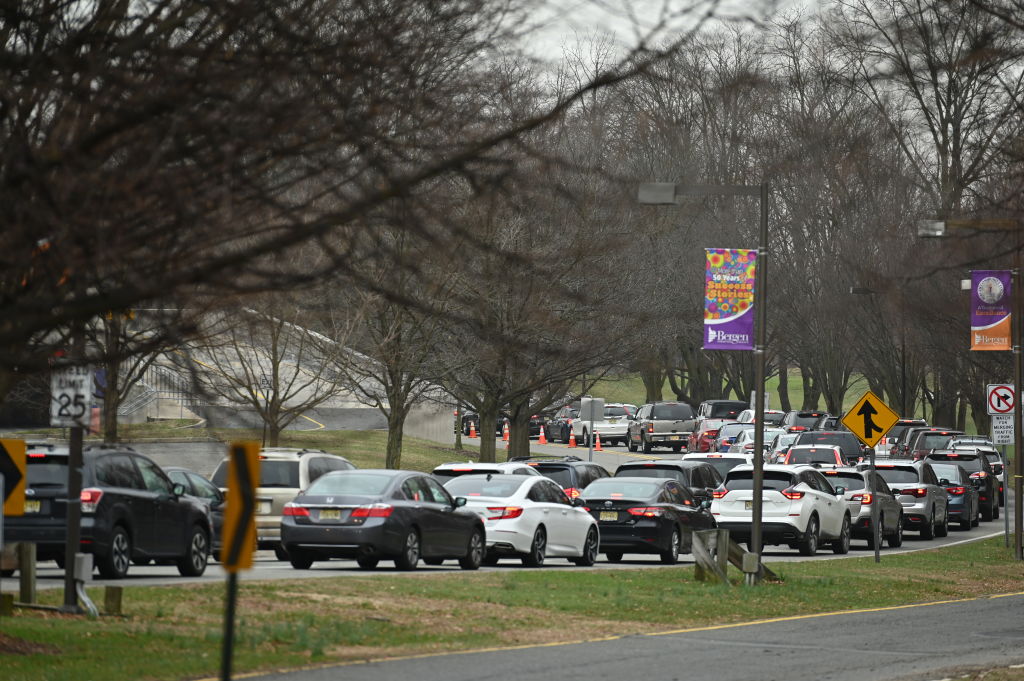The backlog for COVID-19 testing in New Jersey is getting worse


A free daily email with the biggest news stories of the day – and the best features from TheWeek.com
You are now subscribed
Your newsletter sign-up was successful
It's becoming harder, not easier, for people in New Jersey to receive testing for the COVID-19 coronavirus, with some having to sleep in their cars overnight to ensure they are among the lucky ones to get tested.
The New York Times' Rukmini Callimachi found that even when a person is tested, the state has a major backlog, and their test might have to go through a long journey to a lab hundreds of miles away. New Jersey has conducted roughly 115,000 COVID-19 tests, and Gov. Phil Murphy (D) recently admitted when it comes to testing, there are "constraints in the entire food chain." As of Monday night, there are a total of 64,584 confirmed cases in New Jersey, with 2,443 deaths, the Times reports.
Callimachi writes that the initial issue in New Jersey was a lack of test kits, but now there is a shortage of nurses and nasal swabs. Earlier this month, she went to the drive-thru testing site at Bergen Community College in Paramus, where some people got in line the night before to make sure they were one of the 500 people able to get tested.
The Week
Escape your echo chamber. Get the facts behind the news, plus analysis from multiple perspectives.

Sign up for The Week's Free Newsletters
From our morning news briefing to a weekly Good News Newsletter, get the best of The Week delivered directly to your inbox.
From our morning news briefing to a weekly Good News Newsletter, get the best of The Week delivered directly to your inbox.
On the day Callimachi visited, the site ran out of tests by mid-afternoon. The test tubes were put into boxes and covered with ice packs, then driven to the Quest Diagnostics lab in Teterboro. Because there are so many tests being conducted in New York, and only a few hospitals in New Jersey have testing capabilities, this lab has been flooded with specimens. Tests from hospitals also take priority over those that come from drive-thru sites, so Quest decided to send the Bergen Community College tests to a lab in Chantilly, Virginia.
The Virginia lab has a machine that can run 376 tests at a time, with each cycle taking between three to four hours. Quest, however, has to limit the number of tests it runs in a day, because an enzyme necessary for the process is in short supply. Once the tests were completed, Quest sent the results to a federal contractor called Maximus, which then called the patients to let them know whether they tested positive or negative for COVID-19. Read more about the process, and how people Callimachi met dealt with their results once they received them, at The New York Times.
A free daily email with the biggest news stories of the day – and the best features from TheWeek.com
Catherine Garcia has worked as a senior writer at The Week since 2014. Her writing and reporting have appeared in Entertainment Weekly, The New York Times, Wirecutter, NBC News and "The Book of Jezebel," among others. She's a graduate of the University of Redlands and the Columbia University Graduate School of Journalism.
-
 Political cartoons for February 18
Political cartoons for February 18Cartoons Wednesday’s political cartoons include the DOW, human replacement, and more
-
 The best music tours to book in 2026
The best music tours to book in 2026The Week Recommends Must-see live shows to catch this year from Lily Allen to Florence + The Machine
-
 Gisèle Pelicot’s ‘extraordinarily courageous’ memoir is a ‘compelling’ read
Gisèle Pelicot’s ‘extraordinarily courageous’ memoir is a ‘compelling’ readIn the Spotlight A Hymn to Life is a ‘riveting’ account of Pelicot’s ordeal and a ‘rousing feminist manifesto’
-
 Trump HHS slashes advised child vaccinations
Trump HHS slashes advised child vaccinationsSpeed Read In a widely condemned move, the CDC will now recommend that children get vaccinated against 11 communicable diseases, not 17
-
 FDA OKs generic abortion pill, riling the right
FDA OKs generic abortion pill, riling the rightSpeed Read The drug in question is a generic version of mifepristone, used to carry out two-thirds of US abortions
-
 RFK Jr. vaccine panel advises restricting MMRV shot
RFK Jr. vaccine panel advises restricting MMRV shotSpeed Read The committee voted to restrict access to a childhood vaccine against chickenpox
-
 Texas declares end to measles outbreak
Texas declares end to measles outbreakSpeed Read The vaccine-preventable disease is still spreading in neighboring states, Mexico and Canada
-
 RFK Jr. shuts down mRNA vaccine funding at agency
RFK Jr. shuts down mRNA vaccine funding at agencySpeed Read The decision canceled or modified 22 projects, primarily for work on vaccines and therapeutics for respiratory viruses
-
 Measles cases surge to 33-year high
Measles cases surge to 33-year highSpeed Read The infection was declared eliminated from the US in 2000 but has seen a resurgence amid vaccine hesitancy
-
 Kennedy's vaccine panel signals skepticism, change
Kennedy's vaccine panel signals skepticism, changeSpeed Read RFK Jr.'s new vaccine advisory board intends to make changes to the decades-old US immunization system
-
 Kennedy ousts entire CDC vaccine advisory panel
Kennedy ousts entire CDC vaccine advisory panelspeed read Health Secretary RFK Jr. is a longtime anti-vaccine activist who has criticized the panel of experts
